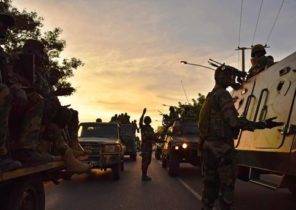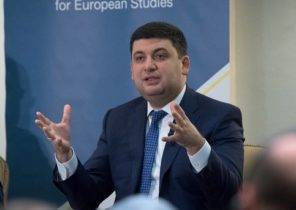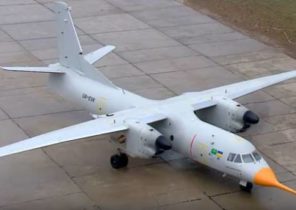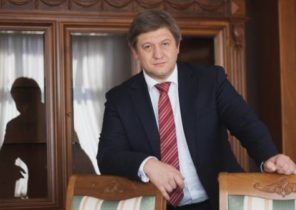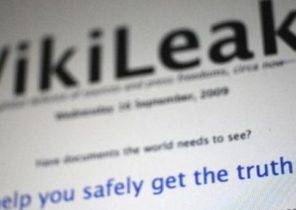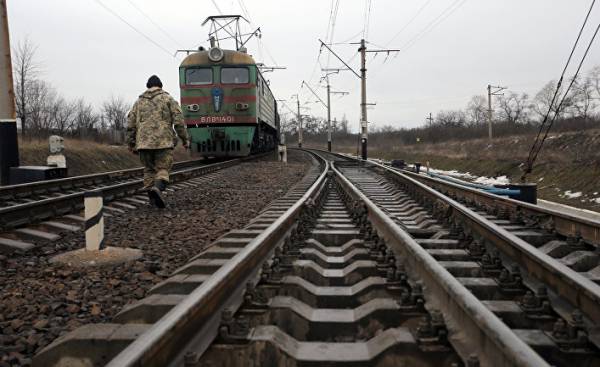
Cold February morning Boguslaw puts on his camo suit, he lights a cigarette, pushes the fabric at the entrance to military tent and the first thing sees the locomotive. Painted bright green paint with yellow stripes. Bohuslav fighting the war. His battlefield is an abandoned railway crossing hours from the Eastern front.
Bohuslav delays freight trains here, on the outskirts of Bakhmut, a town in the East of Ukraine. About 70 thousand inhabitants, the old salt mines. One of them produces the Crimean champagne, but few people know about it, because everyone thinks that it only comes with a famous Peninsula in the South. Along with 30 other men Bohuslav gets on the rails and not allow the train to go further East. In that part of the country, for which Pro-government troops have been fighting with Ukrainian separatists and Russian soldiers during three years.
According to UN estimates, has killed 10 thousand people, but on the front the years, almost nothing has changed. Boguslaw shows the train standing there. “If there will be no more trade, the war will stop,” he says. Like other blocking, he believes that fighting continues just because the oligarchs, the powerful and rich people, who often control the whole industry, profiting off the conflict.
But the blockade also affects the Central issue in this grueling trench warfare without the prospect of the end: separated by the front line people in Ukraine are going to continue to live together? As Ukrainians look to the rest of the country, people in the East, in both the international is not recognized by the separatist republics of Donetsk and Lugansk? They see their victims? Traitors? Criminals?
According to the survey 17% of Ukrainians are in favour of cutting all contacts with the East. The deputies of “Samopomich” party called separatists “ulcer”. In the elections in 2014, the party received 11% and is the third largest in Parliament. Bohuslav opinion can not be accepted by the majority, but it is a minority opinion that grows and becomes louder the longer stretches of war.
Near the tent Bohuslav is another on hilly terrain under the Bakhmut. Men chop wood and throw it in a metal barrel, from which smoke is rising. A few people near her warm hands, someone turned on the radio, it plays “Highway to Hell” AC/DC. Bohuslav is a native of Kiev, where he had his own small enterprise. He sees the situation of the inhabitants of the East is quite clear: it’s “collaborators”, as a Union Hitler and the Vichy regime in France. Still, the residents in may 2014 voted to secede from Ukraine. The fact that the results of the referendum are questionable in many people who are on the side of Boguslav, Ukrainian government and Western diplomats, did not reduce his confidence. “All those who sympathize with Ukraine, has long left the territory,” he says.
To fight as in the novel
Distrust
“If there weren’t trade, stop the war. War is necessary only to oligarchs, which are enriched”.
The bogus, “war veteran”, says that the war in Eastern Ukraine continues, primarily by non-transparent economic reasons. So it blocks the trains.
A year and a half, the 32-year-old man fought in the volunteer battalion on the front line with a length of 500 kilometers. Bohuslav is his Callsign, his civil name he called not want, as he says, security reasons. In childhood he read many military memoirs and adventure novels about the Second world war, he says he always dreamed of battles. In the spring of 2014 he joined the volunteer battalion Donbass. Including because he is against Russia, classical enemy who for centuries had denied Ukraine independence.
“At any moment we could resolve the war by military means — says Boguslaw. But the authorities in Kiev have always been hands are tied. Because of the oligarchs who enriched by this war, it is necessary only to them.” He alludes to people like Rinat Akhmetov, who owns many power plants in Ukraine. Prior to that, he was able to bring them on trains coal from the areas controlled by the separatists on the Ukraine-controlled territory, and there to burn.
Anyone who wants to understand people like Bohuslav should imagine, as, for example, in the frontline town of Avdiivka locomotives seamlessly carry full cars of coal to local power plants, while a few meters away from Ukrainian soldiers are being bombed and killed. For many men of the train became a symbol of everything in this conflict is wrong. When the veterans of the war in the beginning of the year for the first time blocked the way in the East of Ukraine, Bohuslav joined them. “How can I sit at home, when my homeland is still occupied?”
Homeland. When bogus says that he’s actually lost. He believes that if the East did not succeed to win, then you need as much as possible to harm those who were there. He would gladly cut off electricity and water supplies. “Then Russia will finally have to officially care about these areas,” says Bohuslav. The government in Moscow still denies his involvement in the conflict.
Kramatorsk — the last major town directly in front of the combat area, at the border of the city is the first of many checkpoints, which are damaged by strikes and shelling the streets towards the front. Between the gray blocks of houses is the pedestal of the statue of Lenin, painted in blue and yellow. Many Ukrainians want to get rid of the symbols of the Communist dictatorship, the leader of the workers had overthrown during the “de-communization”, and the stump of its former greatness painted in Ukrainian national colors. As the persuasion that there is still Ukraine.
It was not always so. Katerina Filonov remembers the spring of 2014 when she with blue-yellow flag was walking down the street in solidarity with the Maidan, Pro-Western protest movement in the distant 700 kilometers of Kiev. Filonov they threw eggs and called her a Nazi. Few weeks the war began. When the separatists took control of Kramatorsk, Filonov fled the city. She came back only when in the summer of 2014 the Ukrainian army retook the city.
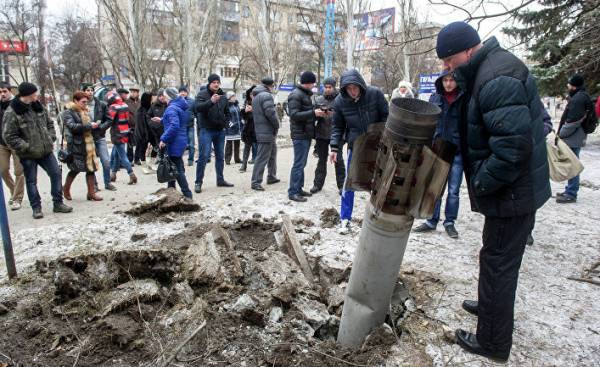 © AFP 2016, Volodymyr ShuvayevНа the streets of Kramatorsk after shelling
© AFP 2016, Volodymyr ShuvayevНа the streets of Kramatorsk after shelling
Before the war, Filonov worked in the regional newspaper. Today, she sees herself as a soldier in the information war in the struggle for the hearts and minds of the people. 40-year-old woman involved in creating the TV shows “up To You”. The name translates as “To you”, she is responsible for the web site.
Before “up To You” was broadcast from Donetsk, but now there’s a team of separatists. Two years ago, some journalists began to produce transmission about exile. The state doesn’t allocate money to date “To You” — a temporary phenomenon. Only in February was delivered to the desks, the head of the program she sweeps the room.
Many colleagues called journalists working in Donetsk at the “First national channel” “traitors” and “terrorists”. Filonov says: “I believe that everyone has personal reasons to leave or to stay.”
To overcome the trenches at the front, she wants to tell us about things that unite people, not divide. Tonight a report on competition in figure skating and a message stating where people are better off humanitarian aid. “Life on the front still continues,” says Katya Filonova. But however she tried not to, she begins to come to terms. Theoretically, transmission can watch two million people, the signal sometimes even reach people who actually needed to hear it, in Donetsk. But on Facebook page transfer “up To You” and has not for 1.5 million subscribers. Even many residents of towns under Ukrainian control, broadcast only in the Ukrainian language the channel is perceived as nationalist propaganda. Thus, they only work for those people who are positively disposed towards Kiev, said Filonov.
Hope has a plan
While Bohuslav fighter and peacemaker Katya Filonova reconciled, George Tuck must do something to spread hope. 53-year-old man sitting on the third floor of the Kiev regional administration in a powerful building of the Soviet times. Throughout the year there is the Ministry of the temporarily occupied territories and internally displaced persons, Tooke — Deputy Minister. Too much time lost Kiev to attract residents of Donbass in Ukraine, he says. In the beginning of the year, the Ministry presented a “Plan for the reintegration of Donbass”. Contacts across the frontline between teachers and pupils, doctors and patients should be encouraged, it is particularly important that patients were ignored as fast as possible through checkpoints such things. It sounds vague and probably should be. The government in Kiev needs to do something, but doesn’t want to give the impression of cooperation with their enemies. It’s been three years, even when it appeared that plan. “We are seeking contact with ordinary people, says Tuka. Is our citizens, as well as all other Ukrainians.”
In mid-April the snow on a railway crossing under the Bakhmut melted. Meanwhile, the Central government in Kiev has temporarily suspended trading with the separatist-controlled areas. Earlier separatists of “nationalized” Ukrainian-controlled enterprises on its territory, but rather, captured. The police eliminated the other blocking the camp, but Bohuslav and his men still in their tents. They won, at least partially, and they do not stop.
